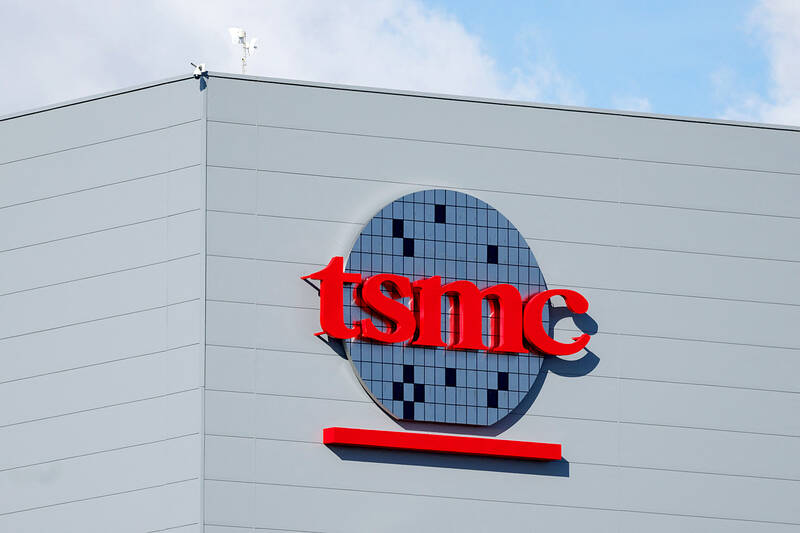Taiwan Semiconductor Manufacturing Co (TSMC, 台積電) took the ninth spot in terms of the market cap of its American depositary receipts (ADRs) in the global market on Monday, after overtaking Berkshire Hathaway Inc, run by US investment guru Warren Buffett, according to data released by companiesmarketcap.
Amid optimism over on-going negotiations between the US and China in London, the tech-heavy NASDAQ index rose 0.31 percent and the Philadelphia Semiconductor Index gained 1.96 percent overnight.
In line with a rally by US tech stocks, TSMC’s ADRs gained 0.89 percent on Monday to close at US$207, boosting the market cap of its ADRs to US$1.07 trillion, surpassing US$1.06 trillion claimed by Berkshire Hathaway shares, which fell 0.04 percent to end at US$493.33 in the day.

Photo: Ann Wang, Reuters
In the wake of the strong showing of semiconductor stocks in the US overnight, TSMC shares on the local main board rose 3.98 percent to end at NT$1,045 (US$34.84) yesterday, the highest closing level since Feb. 6, when the stock ended at NT$1,060.
The gains of TSMC, the most heavily weighted stock on the local market, contributed about 322 points to the rise of the TAIEX, which ended up 2.07 percent at 22,242.14.
The rally of TSMC pushed up the stock’s market cap in Taiwan by NT$1.03 trillion in one session to NT$27.09 trillion.
MasterLink Securities Corp (元富證券) analyst Tom Tang (湯忠謙) said TSMC is still traded at a relatively low price to earnings multiple of 17-18, compared with 31-32 recorded by American artificial intelligence (AI) chip designer Nvidia Corp, adding there is room for TSMC to play catch-up and move higher as global demand for AI applications stays strong.
TSMC yesterday reported its highest ever sales for May, with analysts attributing the strong showing to robust demand for the company’s high-end processes in the booming AI era.
The company posted NT$320.52 billion (US$10.71 billion) in consolidated sales last month, up 39.6 percent from a year earlier.
Last month’s figure was the second highest ever monthly sales in the company’s history, trailing a record high of NT $349.57 billion recorded in April, company data showed.
In the first five months of this year, TSMC generated about NT$1.51 trillion in consolidated sales, up 42.6 percent from a year earlier, it said.
According to MasterLink Securities, TSMC is forecast to rake in about NT$59 in earnings per share this year, compared with NT$45.25 last year.
MasterLink Securities’ forecast represented a downgrade from its earlier estimate of NT$61-62, by taking account of the impact resulting from a stronger New Taiwan dollar against the US dollar.
TSMC has said whenever the NT dollar appreciates against the greenback by 1 percent, its gross margin would fall by 0.4 percentage points.

Six Taiwanese companies, including contract chipmaker Taiwan Semiconductor Manufacturing Co. (TSMC), made the 2025 Fortune Global 500 list of the world’s largest firms by revenue. In a report published by New York-based Fortune magazine on Tuesday, Hon Hai Precision Industry Co. (better known as Foxconn) ranked highest among Taiwanese firms, placing 28th with revenue of US$213.69 billion. Up 60 spots from last year, TSMC rose 60 places to reach No. 126 with US$90.16 billion in revenue, followed by Quanta Computer Inc. at 348th, Pegatron Corp. at 461st, CPC Corp., Taiwan at 494th and Wistron Corp. at 496th. According to Fortune, the world’s

NEW PRODUCTS: MediaTek plans to roll out new products this quarter, including a flagship mobile phone chip and a GB10 chip that it is codeveloping with Nvidia Corp MediaTek Inc (聯發科) yesterday projected that revenue this quarter would dip by 7 to 13 percent to between NT$130.1 billion and NT$140 billion (US$4.38 billion and US$4.71 billion), compared with NT$150.37 billion last quarter, which it attributed to subdued front-loading demand and unfavorable foreign exchange rates. The Hsinchu-based chip designer said that the forecast factored in the negative effects of an estimated 6 percent appreciation of the New Taiwan dollar against the greenback. “As some demand has been pulled into the first half of the year and resulted in a different quarterly pattern, we expect the third quarter revenue to decline sequentially,”

WEAKER ACTIVITY: The sharpest deterioration was seen in the electronics and optical components sector, with the production index falling 13.2 points to 44.5 Taiwan’s manufacturing sector last month contracted for a second consecutive month, with the purchasing managers’ index (PMI) slipping to 48, reflecting ongoing caution over trade uncertainties, the Chung-Hua Institution for Economic Research (CIER, 中華經濟研究院) said yesterday. The decline reflects growing caution among companies amid uncertainty surrounding US tariffs, semiconductor duties and automotive import levies, and it is also likely linked to fading front-loading activity, CIER president Lien Hsien-ming (連賢明) said. “Some clients have started shifting orders to Southeast Asian countries where tariff regimes are already clear,” Lien told a news conference. Firms across the supply chain are also lowering stock levels to mitigate

DIVERSIFYING: Taiwanese investors are reassessing their preference for US dollar assets and moving toward Europe amid a global shift away from the greenback Taiwanese investors are reassessing their long-held preference for US-dollar assets, shifting their bets to Europe in the latest move by global investors away from the greenback. Taiwanese funds holding European assets have seen an influx of investments recently, pushing their combined value to NT$13.7 billion (US$461 million) as of the end of last month, the highest since 2019, according to data compiled by Bloomberg. Over the first half of this year, Taiwanese investors have also poured NT$14.1 billion into Europe-focused funds based overseas, bringing total assets up to NT$134.8 billion, according to data from the Securities Investment Trust and Consulting Association (SITCA),